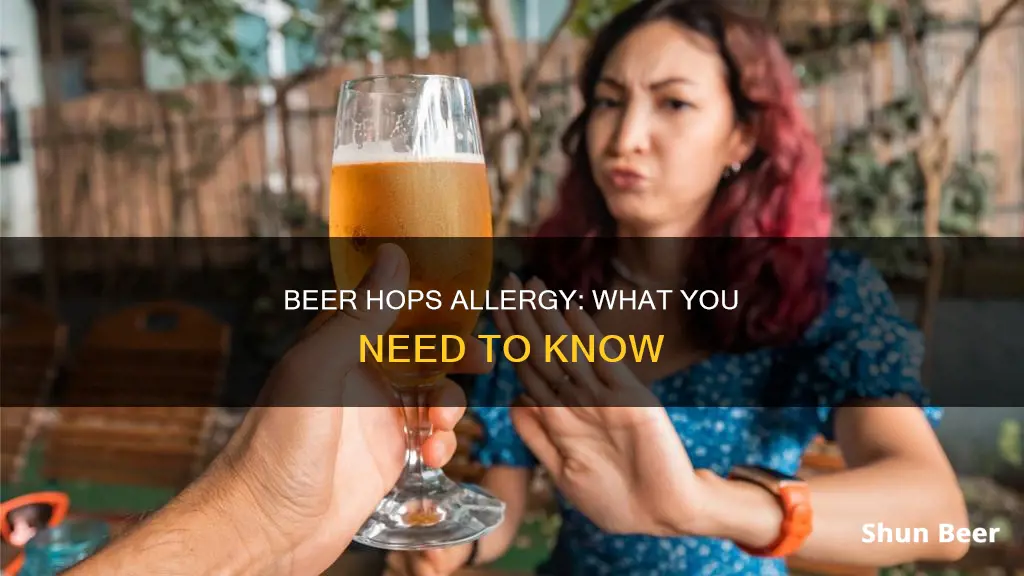
Are you allergic to hops in beer? It's possible. While true beer allergies are rare, it's important to note that beer contains a variety of ingredients, and you may be allergic to one specific ingredient. Hops are among the culprits that could provoke an allergic reaction, with symptoms ranging from sneezing and itching to severe allergic episodes. If you experience any adverse reactions after consuming beer, it's recommended to consult a healthcare professional for proper diagnosis and advice.
| Characteristics | Values |
|---|---|
| Allergy | Rare |
| Symptoms | Sneezing, itchy eyes, hives, abdominal pain, bloating, chest tightness, swelling, anaphylaxis |
| Cause | Immune system response to allergens in hops |
| Diagnosis | Skin prick test, elimination diet, provocation test |
| Treatment | Avoidance, over-the-counter antihistamines, epinephrine injections |
What You'll Learn

What are the symptoms of a hops allergy?
Allergic reactions to hops can vary in intensity, ranging from mild to severe. A mild reaction to hops may include symptoms such as sneezing, an itchy nose, or nasal congestion. For instance, hops can cause sneezing in individuals with a sensitivity or allergy to hops due to the immune system's response to allergens present in hops.
Moderate reactions to hops may include persistent sneezing, nasal congestion, and eye discomfort. In addition, individuals with pre-existing respiratory conditions, such as asthma, may experience exacerbation of their symptoms, including wheezing and coughing.
In severe cases, a hop allergy may lead to pronounced nasal inflammation (rhinitis) and the potential for more intense symptoms, including skin rashes and hives, respiratory issues, and even anaphylaxis. Anaphylaxis is a rare but life-threatening allergic reaction that requires immediate medical attention. Other severe symptoms include abdominal pain and bloating, tightness of the chest, and swelling of the tongue or throat, which can cause breathing difficulties.
If you suspect a hop allergy, it is important to consult a healthcare professional for personalised advice and guidance. They may recommend specific diagnostic procedures, such as skin prick tests or blood tests, to confirm or rule out a hop allergy.
Grow Your Own Hops for Beer: A Step-by-Step Guide
You may want to see also

What are the causes of a hops allergy?
Allergic reactions to hops in beer are rare but possible. Hops, a key ingredient in brewing, can induce an allergic response in certain individuals, leading to discomfort and, in some cases, severe reactions. Here are some causes of a hops allergy:
Immune System Response
When an individual with a hops allergy consumes beer, their immune system identifies the hops as a threat and mounts an immune response. This response can range from mild symptoms such as sneezing, itching, and nasal congestion to more severe reactions like anaphylaxis. The immune system's reaction to hops is similar to its response to other allergens, triggering the production of antibodies.
Unique Proteins in Hops
Hops contain unique proteins that can act as allergens for certain individuals. These proteins are structurally similar to allergens found in other plants, such as birch pollen, leading to cross-reactivity. The body's immune system may recognise these proteins as foreign invaders, initiating an allergic reaction.
Histamines in Alcohol
Histamines are present in varying quantities across different types of alcohol. For individuals with a histamine intolerance or sensitivity, consuming alcoholic beverages with high histamine content, such as red wine, can trigger sneezing and other allergic symptoms. The quantity of histamine in beer can also contribute to hops-induced allergic reactions.
Sulfites in Alcoholic Beverages
Sulfites are commonly used as preservatives in beers and wines to extend their shelf life. However, sulfites can trigger allergy-like reactions, especially in individuals with asthma or sulfite sensitivity. These reactions can include wheezing, coughing, and hay fever-like symptoms. The presence of sulfites in beer may contribute to respiratory symptoms associated with hops allergies.
Existing Respiratory Conditions
Individuals with pre-existing respiratory conditions, such as asthma, may find that consuming alcoholic beverages exacerbates their symptoms. While the hops themselves may not be the direct cause, the irritative impact of alcohol on sensitive respiratory tracts can lead to sneezing, nasal congestion, and other allergic symptoms.
While hops allergies are uncommon, they can significantly impact those affected. Understanding the causes of a hops allergy is crucial for individuals to make informed choices and manage their allergy effectively.
Hops' Preservative Powers: Keeping Beer Fresh
You may want to see also

How is a hops allergy diagnosed?
If you suspect you may be allergic to hops in beer, the best course of action is to consult a medical professional, such as an allergist, who can perform specific allergy tests to diagnose allergies. Here is a detailed overview of how a hops allergy is typically diagnosed:
Initial Consultation
The diagnostic process typically begins with an initial consultation, where a healthcare professional will discuss your symptoms and dietary habits. They will assess the likelihood of a hops allergy and decide on the most appropriate testing methods.
Skin Prick Test
One of the most common and easiest ways to diagnose a hops allergy is through a skin prick test. This involves introducing hop extracts to your skin and observing for any allergic reactions, such as redness, swelling, or itching.
Blood Tests
In addition to skin prick tests, specific IgE blood tests can also be performed to detect the presence of immunoglobulin E (IgE) antibodies to hop proteins in your blood. These antibodies are indicative of an allergic response to hops.
Elimination Diet or Provocation Test
If skin and blood tests are not feasible or require further confirmation, an elimination diet may be recommended. This involves completely avoiding beer or hop-containing products for a period to determine if your symptoms subside. Conversely, a provocation test involves consuming a small amount of beer under clinical supervision to observe for any allergic reactions. It is important to note that provocation tests should only be conducted in a controlled clinical setting.
Component-Resolved Diagnostics
In cases where cross-reactivity is suspected, component-resolved diagnostics can be employed. This technique helps identify specific allergenic proteins within hops that may be triggering your allergic response. This is particularly relevant if you have known sensitivities to pollen allergens, such as birch, alder, or hazel, which share structural similarities with hop allergens.
Allergen Specificity Tests
To further elucidate the precise nature of the allergy, allergen specificity tests may be conducted. These tests measure your immune system's response to hops proteins and can pinpoint the specific proteins responsible for the allergic reaction.
Food Challenges
Food challenges are considered the gold standard for diagnosing food allergies. They involve the controlled administration of hops or hop-containing products in gradually increasing amounts to assess the severity of your reaction. This is typically done under medical supervision and in conjunction with other diagnostic tests.
Comprehensive Testing Approach
It is important to note that diagnosing a hops allergy can be complex due to the presence of multiple ingredients in beer. Therefore, a comprehensive testing approach, including a combination of the above-mentioned tests, may be necessary to establish a definitive diagnosis.
If you suspect you have a hops allergy, it is essential to seek professional medical advice. Self-diagnosis and self-treatment can be risky, and a proper diagnosis from a qualified healthcare provider will help ensure effective management of your condition.
Hops' Role in Brewing: Aromatic and Bitter Beer Balancing
You may want to see also

How is a hops allergy treated?
A hops allergy is characterised by adverse immune reactions upon exposure to hops-derived products. The primary treatment for a hops allergy is allergen avoidance. This involves avoiding hops-containing products, including beer, herbal supplements, and cosmetics. Breweries and other industries that use hops should also implement measures to minimise hop dust exposure.
In the case of accidental exposure or mild symptoms, antihistamines and corticosteroids may provide relief. For example, over-the-counter (OTC) oral antihistamines can help with milder symptoms like sneezing, itching, and hives. Nasal corticosteroids can be used for recurrent nasal allergy symptoms, while allergy eye drops can be used when eye irritation accompanies the sneezing.
For severe reactions, such as anaphylaxis, immediate medical intervention is necessary. Individuals at risk of serious reactions should carry an epinephrine auto-injector (EpiPen) as a precautionary measure.
If you suspect you have a hops allergy, it is important to consult a healthcare professional for personalised advice and testing. They can help determine if you are allergic to hops or another specific ingredient in beer and provide guidance on managing and treating your allergy effectively.
Where to Find Tropical Hop Beer Near You
You may want to see also

What are the alternatives to beer?
If you're allergic to hops in beer, you may experience sneezing, itching, skin rashes, bloating, stomach discomfort, hives, nasal congestion, swelling, and breathing difficulties. It's important to note that these symptoms can also be caused by other ingredients in beer, such as malt barley, brewer's yeast, or other flavourings. Therefore, it's crucial to consult a healthcare professional to determine the specific cause of your allergy.
Now, let's explore some alternatives to beer:
Non-Alcoholic Beer
Non-alcoholic beers are an excellent option for those who want to avoid alcohol but still enjoy the taste and experience of beer. These drinks perfectly mimic the flavour, aroma, and mouthfeel of traditional beer, without the alcohol content. Some notable non-alcoholic beers include:
- Heineken 0.0 Premium Lager
- Buckler Pale Lager
- Athletic Brewing's Run Wild IPA and Upside Dawn Golden Ale
- BrewDog Hazy AF IPA
- Grüvi Mocha Nitro Stout and Non-Alcoholic Pale Ale
- Bravus Brewing's Oatmeal Dark Stout and Amber Ale
Kombucha
Kombucha is a fermented drink that has gained popularity as a healthy alternative to beer. It has a similar taste profile to beer, with different brands offering a variety of flavours. Kombucha is known for its gut-healthy properties due to the presence of fermented culture. However, it's important to note that kombucha typically contains trace amounts of alcohol and higher sugar content than beer.
Hopped Tea and Water
For those who enjoy the flavour of hops, hopped tea and water can be a refreshing alternative. Hoplark, for example, offers a range of sparkling teas and waters that showcase different varieties of hops. Their products are typically sugar-free and calorie-free, making them a healthier choice.
Low-Hop Beers
If you have a mild sensitivity to hops, you may be able to tolerate low-hop beers. These beers have a lower hop content, reducing the likelihood of triggering an allergic reaction. However, it's important to monitor your symptoms and consult a healthcare professional to determine your tolerance levels.
Alcohol-Free Alternatives
If you're looking for a completely alcohol-free option, there are several alternatives to choose from:
- Athletic Brewing's non-alcoholic beers
- Witbeers, such as Hoegaarden Wit 0.0
- Asahi's 0-calorie non-alcoholic beer
- HopTea, a blend of hops and tea
- Holsten Pils, a beer originally brewed for diabetics
Remember, if you suspect an allergy to any ingredient in beer, it's important to consult a healthcare professional for advice and testing. They can help you identify specific allergens and provide guidance on suitable alternatives.
The Hoppy Truth: Do All Beers Have Hops?
You may want to see also
Frequently asked questions
Symptoms of a hops allergy can include sneezing, itchy eyes, hives, and in more severe cases, anaphylaxis.
If you experience any of the above symptoms after consuming beer, it is important to consult a healthcare professional. They can advise on specific diagnostic procedures, such as a skin prick test, to determine whether you have an allergy.
The best course of action is to avoid consuming beer or any products containing hops. Mild reactions may be treated with over-the-counter antihistamines, but in the case of severe reactions, immediate medical attention is required.







